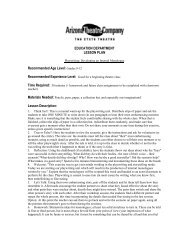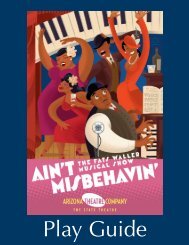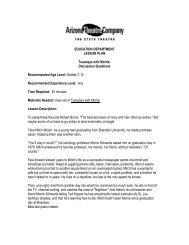Play Guide [1.2MB PDF] - Arizona Theatre Company
Play Guide [1.2MB PDF] - Arizona Theatre Company
Play Guide [1.2MB PDF] - Arizona Theatre Company
You also want an ePaper? Increase the reach of your titles
YUMPU automatically turns print PDFs into web optimized ePapers that Google loves.
MONOLOGUES<br />
A good place to begin discussing monologues is with soliloquies. The word soliloquy<br />
dates to approximately 1613 and is Latin in origin (combining solus which means alone<br />
and loqui which means to speak). A soliloquy is a playwriting convention used when<br />
characters talk to themselves, refl ecting aloud on things that they are thinking. Soliloquies<br />
were often used in Shakespeare plays and are common in Elizabethan plays in general. For<br />
good examples of soliloquies think of Hamlet’s “To be or not to be” speech, and Macbeth’s<br />
“She should have died hereafter (tomorrow and tomorrow and tomorrow)” speech from<br />
Shakespeare’s plays.<br />
Soliloquies are still sometimes used by playwrights, though now more common is the<br />
monologue. A soliloquy is always a monologue but not all monologues are soliloquies.<br />
Sound confusing? The distinction is between the reason the character is speaking and<br />
the receiver of information. In a monologue, a character can deliver the text to another<br />
character, to the audience or to himself or herself. In another type of monologue, a<br />
character can speak uninterrupted for a long period of time to another character. The other<br />
character could want to or try to interrupt, but can’t get the other character to stop talking.<br />
This interaction couldn’t happen in a soliloquy because in a soliloquy, the character<br />
speaks his or her internal thoughts out loud to himself or herself. There is not another<br />
character being addressed. Traditionally, soliloquies are thought of as serious in nature<br />
because often a character speaking a soliloquy often contemplates large issues such as<br />
the meaning of life or the meaning of death. Monologues can also deal with such weighty<br />
issues, but they can also be less serious and sometimes outright silly or funny.<br />
DISCUSSION QUESTIONS<br />
AND ACTIVITIES<br />
The Glass Menagerie<br />
Discussion Questions<br />
1. Tom calls Laura “peculiar,” but Amanda bristles at this word. What is “peculiar” about Laura?<br />
2. Why is the fi re escape important in the play? How does the fi re escape function as a symbol to<br />
reveal something about each character's personality?<br />
3. Which aspects of The Glass Menagerie are realistic? Which aspects are the most nonrealistic?<br />
What function do the nonrealistic elements serve?<br />
4. Generally, plays do not have narrators. How does the fact that Tom is the narrator affect the<br />
style and content of the play? Do you think that your appraisal of the events be different if there<br />
were no narrator?<br />
<strong>Arizona</strong> <strong>Theatre</strong> <strong>Company</strong> <strong>Play</strong> <strong>Guide</strong> 26


![Play Guide [1.2MB PDF] - Arizona Theatre Company](https://img.yumpu.com/11952176/26/500x640/play-guide-12mb-pdf-arizona-theatre-company.jpg)
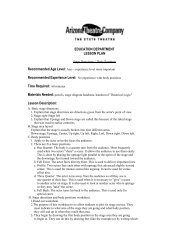

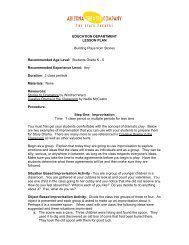
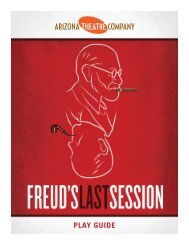
![Play Guide [356k PDF] - Arizona Theatre Company](https://img.yumpu.com/46218320/1/190x245/play-guide-356k-pdf-arizona-theatre-company.jpg?quality=85)
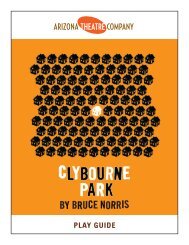
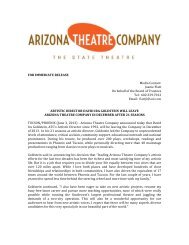
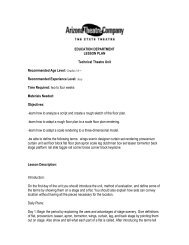

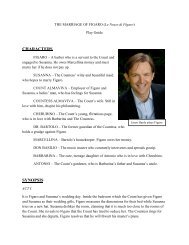
![[title of show] Arizona Theatre Company Play Guide 1](https://img.yumpu.com/24482689/1/190x245/title-of-show-arizona-theatre-company-play-guide-1.jpg?quality=85)
